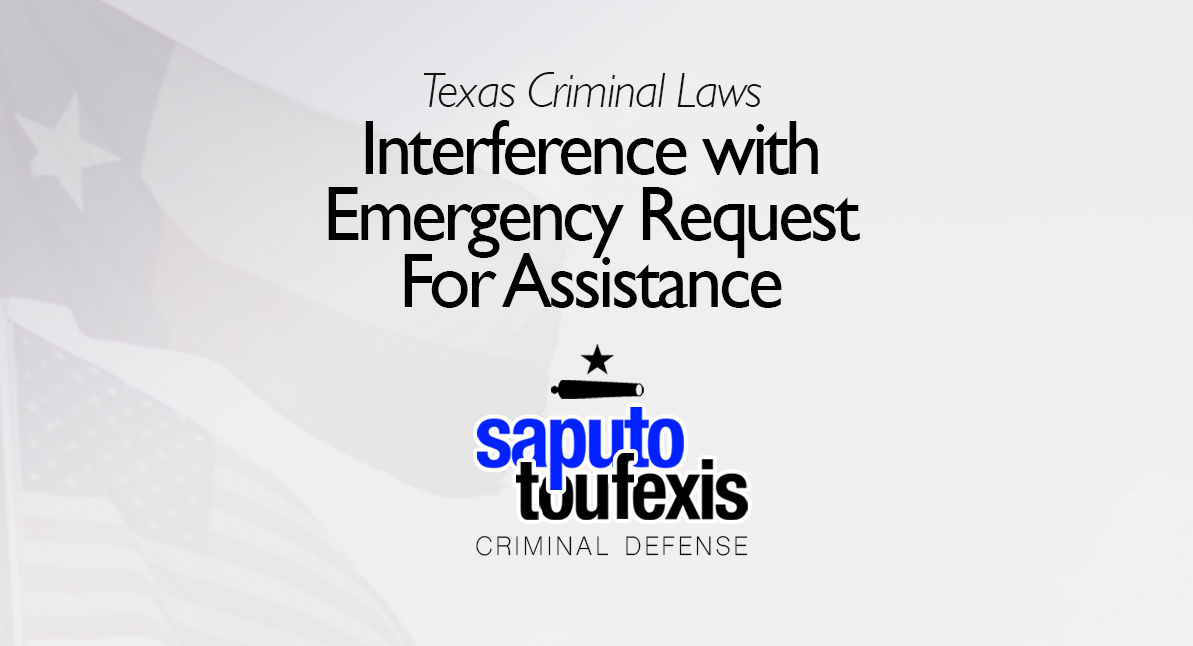The Texas Interference with Emergency Request For Assistance law gives police the right to arrest you if they believe you interfered with someone’s ability to place an emergency call or broke someone’s telephone (or other device) so that they could not call for an emergency.
FAQs about the
Interference with Emergency Request For Assistance law in Texas
- What is the current Texas law about Interference with Emergency Request For Assistance?
- How can I be charged with an Interference with Emergency Request For Assistance offense in Texas?
- What is the statute of limitation for Interference with Emergency Request For Assistance in Texas?
- What is the penalty for a Texas Interference with Emergency Request For Assistance offense?
- Can you get probation for Interference with Emergency Request For Assistance in Texas?
- What level of crime is Interference with Emergency Request For Assistance in Texas?
The Texas legislature codified this criminal offense in Texas Penal Code Section 42.062. The legislature did not update this law in 2023. In fact, this law has not been amended since 2013.
The Penal Code classifies the Texas Interference with Emergency Request For Assistance law under Title 9 “Offenses Against Public Order and Decency,” Chapter 42 “Disorderly Conduct and Related Offenses.” Learn more about the Texas offense of Interference with Emergency Request For Assistance below.
What is the current Texas law about Interference with Emergency Request For Assistance?
Texas law currently defines the offense of Interference with Emergency Request For Assistance in Penal Code Section §42.062 as follows:[1]
(a) An individual commits an offense if the individual knowingly prevents or interferes with another individual’s ability to place an emergency call or to request assistance, including a request for assistance using an electronic communications device, in an emergency from a law enforcement agency, medical facility, or other agency or entity the primary purpose of which is to provide for the safety of individuals.
(b) An individual commits an offense if the individual recklessly renders unusable an electronic communications device, including a telephone, that would otherwise be used by another individual to place an emergency call or to request assistance in an emergency from a law enforcement agency, medical facility, or other agency or entity the primary purpose of which is to provide for the safety of individuals.
How can I be charged with an Interference with Emergency Request For Assistance offense in Texas?
You can be charged with Interference with Emergency Request for Assistance if the state’s attorneys believe that each of the elements of either 42.062(a) or (b), as described in the section above, have been met.
What is the statute of limitation for Interference with Emergency Request For Assistance in Texas?
Misdemeanor level Interference with Emergency Request For Assistance charges have a two-year limitations period.[2] Felony level offenses have a three-year limitations period.[3]
What is the penalty for a Texas Interference with Emergency Request For Assistance offense?
A conviction for Interference with Emergency Request for Assistance is punished by default as a Class A misdemeanor,[4] with a maximum possible fine under Texas state law of up to $4,000 and jail time of up to one year.
If the actor has been previously convicted of this offense, then a conviction for Interference with Emergency Request for Assistance in Texas is punished as a State Jail Felony,[5] with a maximum possible fine under Texas state law of up to $10,000 and jail time of up to two years.
Can you get probation for Interference with Emergency Request For Assistance in Texas?
The Texas Code of Criminal Procedure allows both judges and juries to grant probation for Interference with Emergency Request For Assistance, and judges are also allowed to accept deferred adjudication plea deals.[6]
Note, however, that no matter the offense, neither judges nor juries may recommend community supervision for any suspended sentence of over 10 years.[7] Also, judges may not grant community supervision after a conviction if (1) the defendant used or exhibited a deadly weapon during the commission of the felony or immediate flight thereafter and (2) the defendant used or exhibited the deadly weapon himself or was a party to the offense and knew that a deadly weapon would be used or exhibited.[8]
What level of crime is Interference with Emergency Request For Assistance in Texas?
The Penal Code classifies Interference with Emergency Request For Assistance as either a Class A misdemeanor or state jail felony, depending on the circumstances.
Learn more about the penalty range for this offense in the section above.
Legal References:
^1. Texas Penal Code §42.062. This law is current as of 2024.^2. Code of Criminal Procedure 12.02(a)^3. See Code of Criminal Procedure 12.01(9)^4. Texas Penal Code §42.062(c)^5. Texas Penal Code §42.062(c)^6. See Chapter 42, Texas Code of Criminal Procedure, Art. 42A.054, Art. 42A.056, Art. 42A.102^7. Art. 42A.053(c), Texas Code of Criminal Procedure^8. Art. 42A.054(b), Texas Code of Criminal Procedure










